Meet BREAD, the Black-Owned Australian Curl-Care Brand That's Set to Disrupt Sephora's Hair Aisle
"We want to be a brand that helps to redefine what 'aspirational' means for textured hair, and that includes normalizing certain styles of hair and building up all kinds of textures of hair as aspirational."

Maeva Heim was visiting the U.S. from her native Australia several years ago when she made the choice to stop chemically straightening her hair, once and for all. After an ill-fated experience with a bottle of relaxer that had exploded in her suitcase, the 4C curl haver found herself struggling to track down proper hair-care products for her texture while traveling in Colorado. "The first thing I wanted to do was find products that were specifically designed for my texture. When I went to stores and saw the 'multicultural' hair-care aisle, I was taken aback: I felt like I'd jumped in a time machine and gone back to 1995. I couldn't find any brands on the market catering to my hair type that I could relate to," she says.
She'd been perming her hair since she was a young child, leaving little opportunity to get acquainted with her curls. "While I had protective styling over the years growing up, my natural hair, when left out, was always straight. I had never had to deal with my natural texture or even understand what it was." It was during this trip in her early 20s that she simultaneously decided to embrace her natural curls and start her own hair-care brand. On Tuesday, Heim is officially bringing said brand, BREAD, to market.
"Our mission is to champion diversity in the hair-care category, and also to become the staple of every curly-haired human's hair-care wardrobe," says the founder of the company's mission. BREAD's tightly edited line of wash and care products — developed specifically to cater to 3A to 4C curl patterns — makes its debut Tuesday on BreadBeautySupply.com and Sephora.com, and will roll out into select Sephora brick-and-mortar locations on August 28. Prices range from $20-$58.
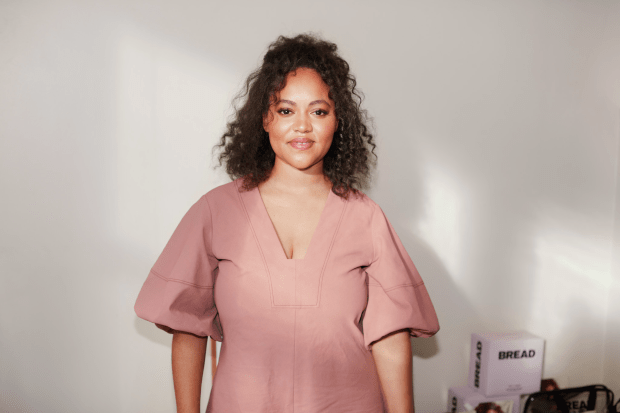
Heim's career has equipped her to introduce her own beauty brand to the world: She's worked for both Procter & Gamble and L'Oréal, and she's no stranger to the level of commitment it takes to get a new brand off the ground. Heim was still working full-time when she started cooking up BREAD as a side hustle, driven by having identified a real gap in the market. "My experience in the industry, but also my experiences as a consumer, led me to realize that the beauty industry wasn't really talking to me. As a woman of color, I didn't feel like I was getting the same level of product availability or brand experience that everyone else was, and I was determined to change that," she says.
It was this clear mission that made BREAD a standout to Sephora executives who chose it as one of the first Australian brands to be selected for Sephora Accelerate, the retailer's incubation program for beauty startups. BREAD also secured a pre-seed round of funding led by Imaginary Ventures.
"As a member of our Accelerate program, founder Maeva has been fearlessly dedicated to filling gaps in the beauty industry and increasing texture-inclusive offerings," says Jennifer Lucchese, VP Haircare Merchandising at Sephora. We are so excited to finally introduce BREAD to our clients and know that it will be a wonderful addition to Sephora's hair assortment."
Ahead of BREAD's official launch, Heim took some time to discuss BREAD's potential to disrupt Sephora's hair aisle, the historical shortcomings of beauty marketing and formulating for Black consumers, reframing the concept of what it means to have 'good' hair and the unique challenges of launching an international brand during a pandemic with Fashionista. Read on for the highlights of our chat.
Related Articles
425+ Black-Owned and Founded Beauty and Wellness Brands to Know
3 Black Women Share Their Natural Hair Journeys
There's Still a Lot of Work to Be Done to End Natural Hair Discrimination
Tell me about your own background and how you decided to create BREAD.
The women of my family have actually been in the beauty industry, in some capacity, for [generations]. My grandmother was a soap maker in a small village in the Ivory Coast, West Africa, and would sell the soaps at the market, and in the '90s, my mother opened an African hair salon in Perth, where I grew up. It was one of the very first African hair salons in the entire country. From the age of 10, I would spend my weekends there braiding customers' hair, sweeping the floors, answering the phone and managing the booking diary.
We would import hair-care products from the U.S. that were designed for textured hair and sell them in the salon. That's how I initially became familiar with the category and what was available in the market for curly and textured hair.
Then, in my early teens, I would trawl through the American Black hair care forums to research product and style trends that were yet to reach the Australian market, and contact suppliers in China to source merchandise for the salon, like lace wigs and specialized hair extensions.
I ended up studying a law degree at university, because I've always been passionate about advocating for marginalized people who don't have a voice. But I also completed a business degree at the same time. I had every intention of becoming a lawyer, but when I finished my degrees, I decided to pursue a career in marketing, and landed an internship at L'Oréal, where I spent my early career. I also did a short stint at Procter & Gamble in Singapore, working on a toothpaste brand.
After my summer with Procter & Gamble, I ended up back at L'Oréal, where I worked across almost every category in the business, but funnily enough, never found myself working on a hair brand. I left L'Oréal knowing I wanted to create a brand that would aim to drive the industry toward a more diverse future, and provide better experiences and products for women of color, specifically Black women.
What inspired you to create a hair-care brand specifically?
It wasn't until I made a trip over to the United States, and flew from New York to Colorado with a hair relaxer in my suitcase. When I arrived in Colorado, I opened up my suitcase and discovered the relaxer had exploded over all of my clothes. I was due for my topup, but was in the middle of nowhere, and didn't have access to get another one. I decided then and there that I was going to stop relaxing my hair.
I soon discovered that I wasn't the only one opting to ditch the relaxer. There was an almost 40% decline of hair relaxer sales over a five year period at that time, and a drastic cultural and commercial shift in the multicultural hair-care category. I knew there was now this whole group of consumers out there, just like me, who were also looking for this brand that didn't exist.
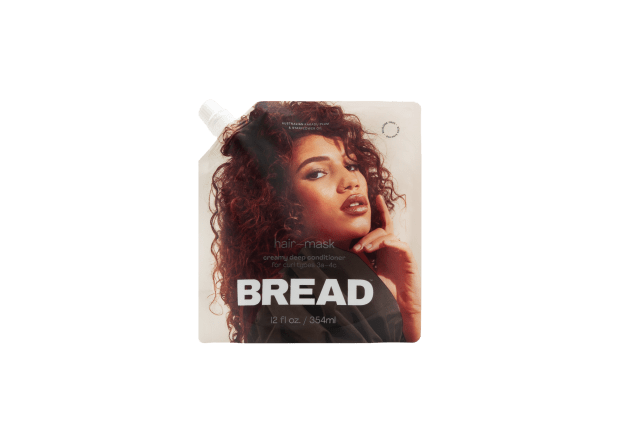
How would you describe BREAD, and who do you aim to create products for?
I like to describe it as hair-care basics for not-so-basic hair. We're creating BREAD for the woman who has curly and textured hair, and doesn't want to spend half a day washing her hair. Our aim is to make wash day as quick as possible, so she can spend less time on her hair, and more time on other things in life.
We really want to make the transition from relaxed hair to natural hair as easy and fun as possible. We want her to feel supported along her journey with educating and style tips, and constantly innovating with product, so that she sticks with it long term.
Why do you see the brand as a disruptor to the industry, and how do you hope to fill a gap in the market?
We're intent on creating a community focused brand and visual universe that feels relevant to today's consumer, and represents her in the way that she wants to be seen. I think brands often push an 'ideal' of what it means to have 'good' hair. That often involves lots of product, and a result which is this super defined, super glossy, no-curl-out of-place look that just isn't realistic for day-to-day life, and is often not achievable for all curl types, especially women like myself with 4C, super coiled hair.
To that point, one thing that I noticed is that language used in the hair industry tends to demonize characteristics that are often natural features of textured hair. For example, frizz: We're taking an anti-anti-frizz stance. What's so bad about frizz anyway?
Can you describe a bit about the product line and different formulas?
I wanted to keep our product assortment super simple, and take the approach of tackling each part of the hair-care routine separately, starting with wash day. We've distilled wash day down to three simple products within our wash kit.
Hair-Wash is a co-wash meets shampoo. It's a light, marshmallow-like liquid that transforms into a gentle lather. It takes care of build-up and debris, without causing knottiness, crispy dryness or stripping your hair of natural oils. And it smells like Fruit Loop milk!
Hair-Mask is a light-to the-touch cream that will leave curls hydrated and buttery smooth without weighing them down. Easy, simple, smells good — like bread.
Hair-Oil is a silicone-free, multi-purpose oil that we describe as being like a lip gloss, but for your hair. It's really your go-to oil for use throughout the day or week, and can also be used as a pre-wash treatment.
What went into creating them?
We know that hair products marketed toward Black women are disproportionately more toxic than those available in the general market. So I wanted to make sure our formulas were clean and safe, and avoid ingredients that could potentially be harmful, or that are not useful for textured hair specifically — ingredients that are going to dry the hair out, like harsh sulfates, we've avoided. We've also kept our formulas vegan, and our merch (like our hair scrunchies), are satin rather than silk, so they are vegan-friendly too.
In terms of packaging, I knew I wanted this brand to exist on the shelves of Sephora. I wanted to ensure that the woman we were speaking to would know immediately that this brand was for her, without even having to read the packaging or any other brand material on the shelf, so I decided to put the product in spout pouches, giving us enough real estate to be able to put faces on our products. So when our audience walks in to a Sephora to buy their makeup or skin care, they will be able to spot us over in the hair section, and know that there is a brand there made for her.
How did you come up with the name BREAD and what does it represent?
Knowing that I wanted this brand to be the staples of a hair-care wardrobe, I wanted a name that reflected this it's a brand that's here for the essentials, the must-haves — like bread.
How did your Australian identity impact the ethos and concept for the brand or the products, if at all?
Coming from Australia, I really wanted to highlight and celebrate the incredible native ingredients that grow here that have been used a lot in skin care, but not as much in hair, even though many of our native ingredients have properties that are incredible for textured hair.
The current range features Australian kakadu plum, which has the highest concentration of vitamin C of any known fruit (about 50 times more than an orange), which is great for scalp health.
The brands' lazy-girl hair positioning was also heavily influenced by [my experience] growing up in Australia. There's a strong beach culture here, and I never felt like I was part of that salty, beachy, 'effortless' hair that was considered the epitome of beauty. My drive to change the narrative around what's considered 'beautiful' hair has definitely been driven by that experience growing up, and not necessarily feeling like I fit that very narrow beauty ideal.
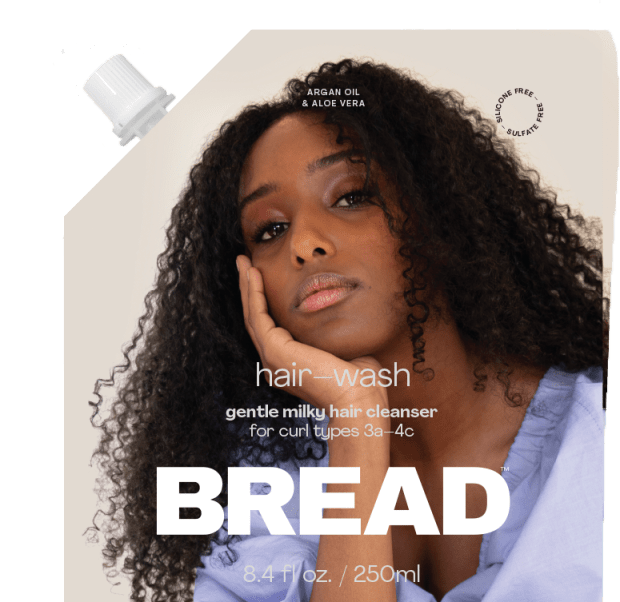
Tell me about your experience with the Sephora Accelerate program.
Accelerate was pivotal in helping me get to the next stage of BREAD, which was our funding, and ultimately a launch partnership. When I started building BREAD, I knew it was a brand that needed to exist in Sephora.
I managed to get a meeting with a hair-care buyer really early on in the BREAD journey, when all I had was a powerpoint slide and a few early stage samples. They loved the idea, and kept in touch over a period of a few years as I worked on BREAD as a side-hustle while still working full time. Then, last year, when applications opened up for Australia-based brands for the first time in the program's history, one of the merchants actually put me forward. The interview process was rigorous, and that process alone really helped me to define and commit to what BREAD was and should be.
The program itself was perfect for me and the stage that I was at. I was lucky enough to have the Senior Hair Merchant as my mentor throughout, and connect with so many key people within the Sephora business that I would later end up working with as part of the launch preparation process.
I was also introduced to our lead investor via an introduction from an investor who saw me present at the Sephora demo day. Between that introduction and the brand receiving its first major investment check, it was about two months. Before that, I had literally spent years flying in and out of the country trying to build relationships and raise early stage funding.
Were there any other key meetings or connections that really helped get the company off the ground?
There are people who have helped bring BREAD to life over the years, sometimes in ways that they don't even realize. One of those people is Elaine Welteroth. She came on a trip to Australia, and met with me for a coffee after I had sent her a cold email asking to meet. We had an amazing chat about representation in beauty, and the difference in race relations in between Australia and the U.S.
When the Teen Vogue conference came up, she invited me to come and offered to get me backstage so I wouldn't need to pay for a ticket. That happened to be where I met a Sephora executive who got me my meeting with the hair-care team. Had Elaine not been so insistent and helpful in getting me to that conference, I don't know that everything that came after that — Sephora Accelerate, and now launching with Sephora — would have happened.
Sephora recently faced criticism for stocking only nine Black-owned brands on its shelves, but it was also one of the first major retailers to sign on to the 15 Percent Pledge and commit to expanding the representation Black-owned businesses in its inventory. How does it feel to be launching BREAD with Sephora and what kind of opportunity do you think this expansion in product diversity will bring to Sephora as a retailer?
I think as it relates to the hair category specifically, Sephora has been on a path toward providing more product diversity for awhile. I had been in discussions with them for a few years, and knew that getting their textured hair care assortment right was an ongoing priority, and our launch partnership had been in the works for over a year before the 15 Percent Pledge. The entire hair merchant team at Sephora has been incredibly supportive since day one, and I know they are putting in the work to ensure that the hair category is representative of textures, ensuring that everyone has options, and Black-owned brands are better represented.
I wasn't surprised that they were one of the first to sign on to the 15 Percent Pledge. They were already on that path, so I feel like current movement is only going to accelerate that, and I'm super proud to be amongst a crop of new Black-owned brands that will be hitting the shelves.
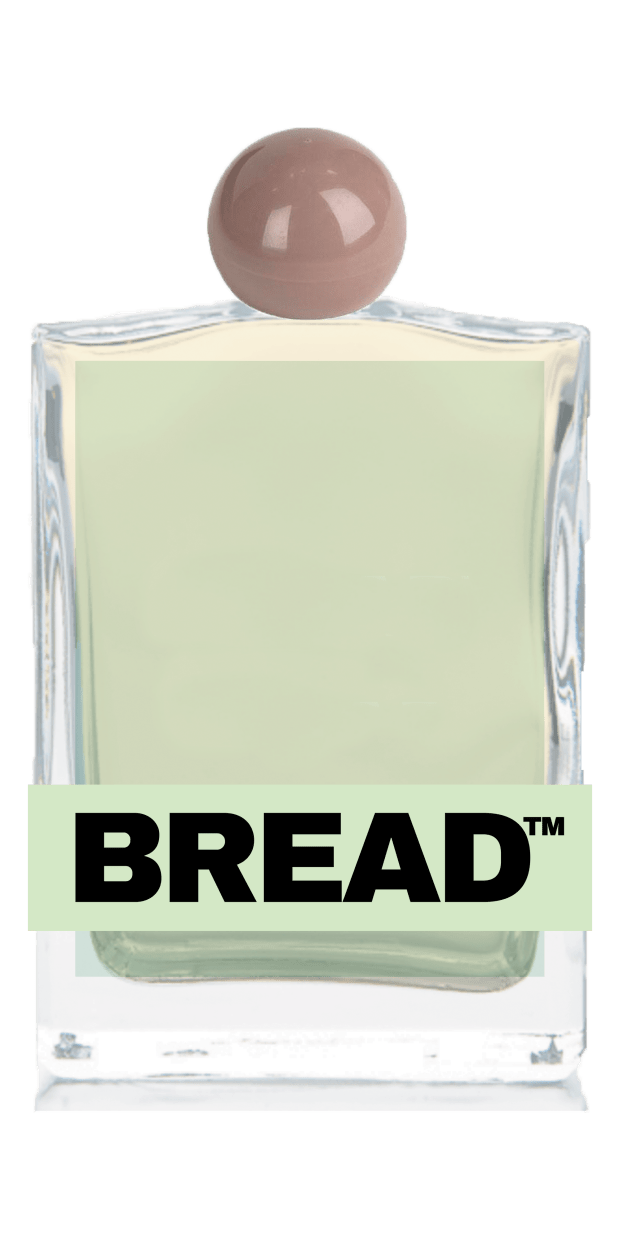
How does BREAD speak to millennials and Gen-Z shoppers, and what do you think those demographics are looking for when it comes to beauty products?
I want BREAD to feel more like a fashion and less like a typical beauty brand. There aren't really many brands speaking to this younger audience of women who don't want to buy into the brands their Mom did. They want something new and fresh — something that reflects their aesthetic and who they are.
There's also this rhetoric that textured hair is hard and time consuming to look after, and requires lots of product and manipulation. But I want our audience to feel like hair is fun, easy and casual.
Black women haven't typically been included in conversations or messaging around 'lazy-girl' or 'done un-done' hair, and I want her to feel like she, too, can have a carefree hair lifestyle. Part of that is normalizing all kinds of curly textures and leading the way on what 'aspirational' hair is for 2020 and beyond.
Tell me about the experience of launching a brand during a pandemic. What unique challenges have you had to cope with?
It certainly provided its fair share of challenges. Being an international company, with an international founder and a supply chain that stretches across multiple countries, means that travel is a huge part of our operations. The shutdowns from coronavirus across the world meant that we had to be extremely nimble, and keep pushing forward with what we could. It's a difficult balance between wanting to give yourself more time because of the time setbacks, but also needing to get to market as quickly as possible and not run out of cash. I think we came to a nice compromise, and only delayed by about a month or so, thanks to our amazing operations team.
What advice would you have for other founders right now?
My advice would be to think really hard about whether now is absolutely the time that you need to launch, or if there is a business — and human — case for delaying your launch. For us, there were a number of factors that meant we needed to launch at this particular time, and we made the best of it.
Click through the gallery below for a first look at BREAD's product lineup.
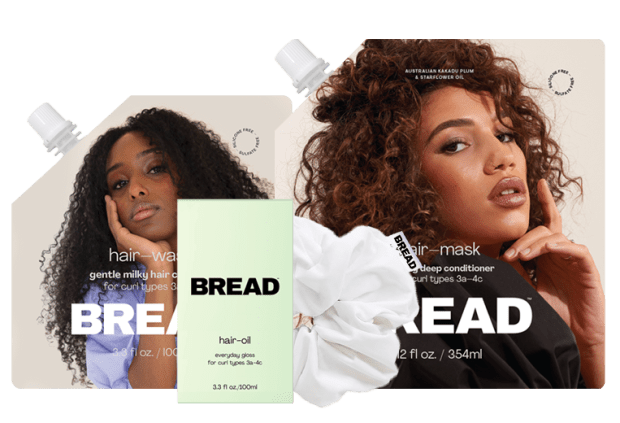
BREAD Kit 1: Wash, $58, available here.
View the 5 images of this gallery on the original article
This interview has been edited for clarity.
Please note: Occasionally, we use affiliate links on our site. This in no way affects our editorial decision-making.
Never miss the latest fashion industry news. Sign up for the Fashionista daily newsletter.
